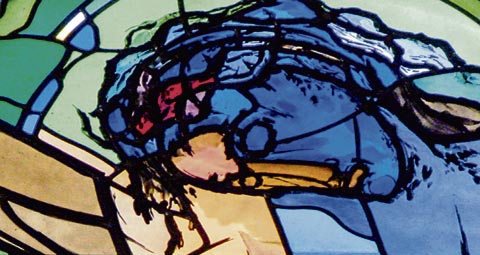March 25 | ![]() 0 COMMENTS
0 COMMENTS ![]() print
print

A Contemporary Apologetics
— RONALD ROLHESIER
One of the reasons why we don’t often find a good Christian apologetics today is because so many of our best theologians write at such a level of academia that their thoughts are not really accessible to the ordinary person in the pews. Apologists like C.S. Lewis and G.K. Chesterton are rare. We have great thinkers in theology today, but unfortunately many of them cannot be profitably read outside of academic settings.
With this as a background, I would like to recommend a very helpful book, Faith-Maps, just published by Michael Paul Gallagher, a Jesuit professor at the Gregorian University in Rome. Professor Gallagher has a background in literature which keeps him sensitive to the kind of language which can speak to the popular mind and still remain the language of depth and soul. That’s the gift he brings to this book.
What the professor does in Faith-Maps is take ten major Christian thinkers (John Henry Newman, Maurice Blondel, Karl Rahner, Hans Urs von Balthasar, Bernard Lonergan, Flannery O’Connor, Dorothee Soelle, Charles Taylor, Pieranglo Sequeri, and Pope Benedict XVI) and write a brief chapter on each of them within which he explains, in lay terms, the kernel of their major insight. Moreover he does this with a certain apologetic intent, that is, to have each of them deliver a short, clear challenge to our generation, especially as pertains to our struggle with faith and with church. And in doing this, Professor Gallagher proves himself as both a gifted and an unbiased teacher: He lays out the central concepts of these thinkers in a way that, for the most part at least, is accessible to the non-professional and in a way that doesn’t fall into either liberal or conservative bias.
I heartily recommend the book for all who want to familiarise themselves with these great thinkers and who are willing to let themselves be stretched a bit intellectually. I recommend it particularly to anyone who is struggling intellectually with his or her faith. This is a book on adult apologetics.
Allow me just one example of Professor Gallagher’s genius in his selection of thinker, theme, and challenge: In outlining some of the major themes in the thinking of Han Urs von Balthasar he writes:
“Modern thinking has been dominated by the ‘turn of the subject’. Insofar as Balthasar tried to purify the excesses of this school and to initiate a ‘return to the object’, his work questions deeply-rooted assumptions in the culture around us and even in our personal living of faith. Under the influence of my literary training (a parallel to Balthasar) and then in the cultural revolution that religious life experienced in the 1960s and 1970s, my spirituality certainly became more subjective. Quietly, a whole tradition of asceticism was set aside, not only in the sense of abandoning external austerities, but of allowing self-fulfillment to replace self-sacrifice as a core value. Our generation discovered self-expression and affectivity. All this was exciting and worthwhile, and yet, on reflection, in danger of being one-sided. Almost imperceptibly we came to live a new set of priorities, where the subjective aspect of religion became stronger than the objective. Even prayer was often judged in terms of experience (initially a positive revaluing of a neglected dimension). ‘How do I feel’ became a litmus paper for growth.”
If I recognise how this new sensibility influenced spirituality, the reading of Balthasar raises awkward but important questions. His emphasis on ‘objectivity’ invites me to make room for adoration and for obedient reverence of God. This breaks the magnifying glass of subjectivism. His language of faith reminds me that the glory of God is greater than any possible response of mine. The glory that shines in the face of Christ is indeed a call to ‘humanity fully alive’ (to echo Iranaeus) but that glory goes beyond self-measured fullness, because it is the radiance of the Crucified Jesus as Risen Lord. It stands over against me rather as a great work of art, that moves me, but is always itself, not dependent on me for its power and beauty. In Balthasar’s words (in one of his numerous evocations of the experience of art as a parallel for the experience of faith): ‘the originality of a work of art’ can only be perceived ‘by the impression it gives of complete inevitability with perfect freedom, overwhelming the beholder, and making one say: it could only have been thus.’
A good apologetic has to make deep thought accessible, though without dumbing-it-down. It has to make things simple without being simplistic. Academic theologians generally struggle with the accessibility part of the equation, while popular spiritual writers, catechists, and preachers struggle with retaining the depth. Not many people can do both. Michael Paul Gallagher does both in this book. Faith-Maps reaches into the deep wells of ten major thinkers, extracts some of their gold, displays it in a way that makes it more visible to the untrained eye, challenges us to understand our faith more deeply, and gives us a rich arsenal of concepts with which to do that.










